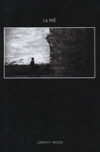I & We
I & We is Joseph P. Wood’s first full-length collection of poetry, having authored five chapbooks before. The poems in I & We are aggressive, violent at times, surprising, and unusual. The poem “In What I Have Done & What I Have Failed To Do,” which opens the book, concludes with the lines “I never thought God / would snap my spine,” after the speaker having described him or herself as “the photographer / snapping The Cross submerged in my urine.”
I & We is Joseph P. Wood’s first full-length collection of poetry, having authored five chapbooks before. The poems in I & We are aggressive, violent at times, surprising, and unusual. The poem “In What I Have Done & What I Have Failed To Do,” which opens the book, concludes with the lines “I never thought God / would snap my spine,” after the speaker having described him or herself as “the photographer / snapping The Cross submerged in my urine.”
The free verse style of the poetry allows for surprises that throw the reader off balance, working off of association. “Newfoundland” is one of the more experimental poems in the collection—the prose poem lacks punctuation and capitalization, and repeats phrases such as “fishermen clapping” and “fishermen fold,” the repetition growing heavier toward the end of the poem.
“Diary Excerpt of a Laid-Off Philadelphia Ferry Worker, Circa 1930” was one of the most striking poems in the collection. A prose poem narrated by the Ferry Worker, it incorporates elements of description, such as “the fog was thick, the air lined with ice—& I heard women talk of pulling their shawls tighter & of the puffs of steam from their mouths,” with thoughts that, I believe, are present in the collection as a whole:
I used to think the human heart was something of a vault & all we had to do was look inward to withdraw from it. Now, the heart is still a vault, but the bank in which it’s encased is just so much paper lining the floors, so much dust in the air. It makes you want to tie an anchor to your feet. It makes you want to take a poker to your wife, & she to you. But sometimes she & I walk by the river, & an old man is selling apples. I buy one & hand it to her. On the opposing bank, there’s one small glint of light, from where we do not know, & that, I dream, is where we’re going.
Though the poems can be, frankly, scary at times, there is an element of grace in the collection. Babies are mentioned in several of the poems—“Our History, Chapter V: ‘War Brewing,’” “Facts,” “Our Luck,” and “A Half-Century Contemplating the Double Helix,” to name a few. This works as a symbol of hope, innocence, and new life among such frightening images as the beheaded corpse in “Below the Saw Blade.”
The book explores the heights of innocence and depths of depravity, often in the same poem; these highs and lows make for an intelligent and interesting, if at times off-setting, collection.




